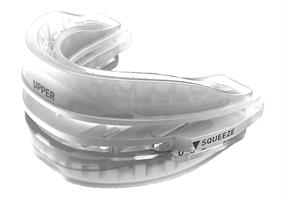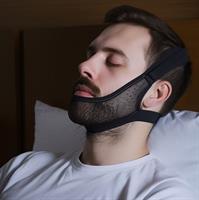Snoring – an annoyance for some, a nightly ordeal for others. But did you know that snoring can also lead to a sore throat from snoring? The connection between snoring and sore throats is often overlooked, yet understanding this link is crucial for achieving better sleep and overall health.
In this article, we’ll delve into the causes of snoring, how it can result in sore throat from snoring, and the practical solutions and medical interventions available to reduce snoring and improve your well-being.
Key Takeaways
-
Snoring can cause sore throats due to dryness, irritation and enlargement of throat tissues.
-
Practical solutions such as lifestyle changes, sleep position adjustments, humidifiers/ nasal decongestants and anti-snoring devices like mouthpieces can help reduce snoring & prevent sore throats.
-
Healthcare professionals should be consulted if symptoms persist. Sleep studies may be necessary for accurate diagnosis & tailored treatment plans.
The Connection Between Snoring and Sore Throats
Snoring occurs when air flows through relaxed tissues in the upper airway, causing the tissues to vibrate and create the harsh sound we associate with snoring. This vibration can lead to sore throats due to dryness and irritation of the oral cavity and throat, as well as enlargement of throat tissues caused by vibrations of throat muscles.
In fact, serious sleep disorders like obstructive sleep apnea, allergies, weight gain, or advancing age may contribute to snoring. Appreciating the link between snoring and sore throats allows us to progress towards uncovering efficient solutions and enhancing our sleep quality.
In addition to causing sore throats, snoring may also result in various health problems, such as Type II diabetes and hypertension, due to oxygen deprivation. Furthermore, being overweight can contribute to the development of obstructive sleep apnea-related symptoms, including snoring-related sore throats. Tackling the root causes of snoring can help to ease sore throats and augment overall health.
Dry Mouth and Throat Irritation
Dry mouth is a condition wherein the salivary glands in the mouth do not generate sufficient saliva, resulting in a sensation of dryness in the mouth and throat. Snoring, especially through the mouth, can exacerbate this dryness, leading to irritation and discomfort. The repercussions of dry mouth on sore throats can include:
-
Persistent sore throat
-
Difficulty swallowing
-
Hoarseness
-
Dry nasal passages
Other indications may include halitosis, cracked lips, and a dry, rough tongue.
To address dry mouth and throat irritation, treatments may include:
-
Consuming ample fluids
-
Abstaining from alcohol and caffeine
-
Utilizing a humidifier
-
Utilizing over-the-counter saliva substitutes
In more severe cases, a physician may prescribe medications to increase saliva production. Focusing on remedying dry mouth and throat irritation can notably diminish the discomfort and soreness instigated by snoring.
Swelling of Throat Tissues
Severe snoring can lead to swelling of throat tissues due to the vibrations of the soft tissues in the throat. This swelling can result in sore throats, difficulty breathing, and other health issues. Recognizing and tackling the factors promoting severe snoring is vital to shrink swelling of the throat tissues and avoid sore throats.
Lifestyle modifications, such as abstaining from alcohol and smoking, sleeping on one’s side, and utilizing a humidifier, can help to reduce swelling of throat tissues. Additionally, medical interventions such as Continuous Positive Airway Pressure (CPAP) therapy, oral appliances, and surgical options may be suggested to provide more comprehensive solutions for snoring and sore throats.
Obstructive Sleep Apnea: A Major Culprit in Snoring-Related Sore Throats
Obstructive Sleep Apnea (OSA) is a sleep disorder characterized by:
-
Episodes of breathing pauses, gasping, or choking during sleep
-
Excessive daytime sleepiness
-
Restless sleep
-
Morning headaches
-
Sore throat upon awakening
OSA is a major cause of snoring-related sore throats, as the breathing pauses and loud snoring associated with OSA can cause a sore throat due to dryness and irritation. Thus, managing OSA is a critical stride in diminishing snoring and averting sore throats.
In addition to causing sore throats, OSA can also lead to a variety of health complications, such as:
-
high blood pressure
-
stroke
-
heart attack
-
diabetes
Diagnosing and treating OSA enables us to not only ease snoring and sore throats but also notably enhance our overall health.
Breathing Pauses and Loud Snoring
Breathing pauses and loud snoring are common symptoms of OSA, which can lead to sore throats and other health problems.
When we sleep, our airway muscles relax, and in some cases, this relaxation can cause a partial or complete blockage of the airway, leading to breathing pauses. These pauses can last from a few seconds to minutes and may occur multiple times per hour. As a result, the oxygen levels in the blood drop, causing the brain to briefly awaken to reopen the airway. This cycle of interrupted sleep can have a significant impact on sleep quality and overall health.
In addition to sore throats, OSA can also cause various health problems, including daytime fatigue, heart issues, and an increased risk of stroke. Identifying OSA through sleep studies and executing suitable treatments can assist in enhancing sleep quality, lessening snoring, and soothing sore throats.
Health Problems Associated with OSA
OSA is a serious sleep disorder that can cause various health problems if left untreated. Poor sleep quality, daytime exhaustion, memory problems, irritability, and difficulty concentrating are some of the common consequences of untreated OSA.
Moreover, OSA increases the risk of developing heart disease, stroke, and type 2 diabetes. As such, it is crucial to identify and address OSA as early as possible to prevent these health complications.
Timely diagnosis and treatment of OSA can significantly improve sleep quality and overall health. Treatment options for OSA include:
-
Lifestyle changes
-
Sleep position adjustments
-
CPAP therapy
-
Oral appliances
-
Surgical options
Employing the right intervention enables individuals with OSA to stop snoring, soothe sore throats, and lower the risk of serious health complications.
Practical Solutions to Reduce Snoring and Prevent Sore Throats
Besides medical interventions, there are practical solutions that can help reduce snoring and prevent sore throats. These include lifestyle changes, sleep position adjustments, and using humidifiers or nasal decongestants. Implementing these practical solutions can help alleviate snoring and improve sleep quality, ultimately leading to better overall health.
Incorporating these changes into our daily lives can significantly reduce snoring and sore throats. Focusing on the causes of snoring and sore throats enables us to enhance our sleep quality, alleviate discomfort, and ward off potential health issues linked with snoring and sleep apnea.
Lifestyle Changes
Lifestyle changes can play a significant role in reducing snoring and sore throats. Maintaining a healthy weight is crucial, as excess weight can contribute to the development of obstructive sleep apnea and snoring-related sore throats. Losing weight can help eliminate snoring and reduce sore throat symptoms.
Other lifestyle changes that can help reduce snoring and sore throats include quitting smoking and abstaining from alcohol. Smoking can irritate the throat and nasal passages, while alcohol can relax the throat muscles, increasing the chances of snoring. Embracing these lifestyle changes allows us to take an active role in reducing snoring and warding off sore throats.
Sleep Position Adjustments
Adjusting sleep positions can also help to reduce snoring and prevent sore throats. Sleeping on one’s side, rather than on the back, can help keep the airways open and reduce snoring.
Elevating the head with a pillow may also assist in preventing the tongue and other tissues from obstructing the upper airway during sleep, thus reducing snoring and sore throats.
In addition to side sleeping and elevating the head, some individuals may benefit from using specially designed pillows that promote proper neck alignment and minimize airway obstruction. Testing different sleep positions and supportive pillows can help us discover the most comfortable and efficient solution for lessening snoring and averting sore throats.
Humidifiers and Nasal Decongestants
Humidifiers and nasal decongestants can also help alleviate snoring by maintaining proper humidity levels and clearing nasal passages. Dry air can irritate the throat and nasal passages, contributing to snoring and sore throats. Utilizing a humidifier can:
-
Add moisture to the air
-
Maintain a comfortable environment in the bedroom
-
Help reduce snoring
-
Prevent sore throats
Nasal decongestants can help clear nasal passages, facilitating easier breathing and reducing snoring. These over-the-counter medications can be particularly helpful for individuals who experience snoring due to nasal congestion from allergies or a common cold.
Integrating humidifiers and nasal decongestants into daily routines can establish an ideal sleep environment that curbs snoring and wards off sore throats.
Medical Interventions for Snoring and Sore Throats
In some cases, snoring and sore throats may require more targeted medical interventions. Continuous Positive Airway Pressure (CPAP) therapy, snoring mouthpieces, and surgical options are some of the medical interventions available for addressing snoring and sore throats. These treatments can be tailored to the individual’s specific needs and may provide more comprehensive solutions for snoring and sore throats.
Exploring these medical interventions allows individuals with persistent snoring and sore throats to identify effective solutions that notably enhance their sleep quality and overall health. Some possible treatment strategies for snoring and sore throats include:
-
Continuous positive airway pressure (CPAP) therapy
-
Oral appliances
-
Nasal strips or dilators
-
Surgery
Consulting a healthcare professional is crucial to ascertain the most suitable treatment strategy for snoring and sore throats.
Continuous Positive Airway Pressure (CPAP) Therapy
CPAP therapy is a widely-utilized treatment for OSA, designed to maintain airway patency and enhance sleep quality.
A CPAP machine delivers pressurized air through a mask that is worn while sleeping, which assists in maintaining open airways and reducing snoring. This therapy is particularly beneficial for individuals with severe snoring and sleep apnea, as it can significantly improve sleep quality and alleviate sore throats.
While CPAP therapy is a highly effective treatment for OSA, it is important to remember that it is not necessary for all individuals with snoring issues. A consultation with a healthcare professional is vital to decide if CPAP therapy is the best treatment option for your snoring and sore throats.
Oral Appliances: Snoring Mouthpieces
Snoring mouthpieces are specialized oral appliances designed to facilitate airflow during sleep, thereby diminishing snoring and throat discomfort caused by mouth breathing. These devices work by maintaining the lower jaw in a slightly forward position, which helps keep the airway open and reduces snoring.
Anti-snoring appliances can be particularly beneficial for individuals with mild to moderate snoring or sleep apnea and those who cannot tolerate CPAP therapy.
While snoring mouthpieces can be effective in reducing snoring and alleviating sore throats, they may also cause some temporary side effects, such as tooth discomfort, increased salivation, and temporomandibular joint pain. These side effects are typically mild and temporary if addressed promptly.
Consulting a healthcare professional is essential to decide if a snoring mouthpiece is the best treatment choice for your snoring and sore throats.
>> Check out Top SnoreRx Plus, our favorite mouthpiece <<
Surgical Options
Surgical options may be considered for snoring and sore throats if other methods are not successful. These include procedures such as uvulopalatopharyngoplasty (UPPP), radiofrequency ablation (RFA), and laser-assisted uvulopalatoplasty (LAUP), which involve removing or shrinking the tissue in the back of the throat to reduce snoring.
While surgical options can provide effective relief for snoring and throat pain, they also carry potential risks, such as:
-
pain
-
bleeding
-
infection
-
scarring
Furthermore, there is a possibility of recurrence of snoring and sore throats following the procedure. A consultation with a healthcare professional is crucial to decide if surgical options are the best course of treatment for your snoring and sore throats.
When to Consult a Healthcare Professional
It is crucial to consult a healthcare professional if you suspect sleep apnea or experience persistent snoring and sore throats. Identifying and addressing the underlying causes of snoring and sore throats can significantly improve sleep quality and overall health.
A healthcare professional can provide personalized advice and recommend appropriate diagnostic tests and treatment options for your snoring and sore throats.
Seeking medical advice promptly allows individuals with snoring and sore throats to comprehend their condition better, apply effective solutions, and enhance their sleep quality. Furthermore, addressing snoring and sore throats can positively influence overall health, lowering the risk of serious health complications linked with snoring and sleep apnea.
Identifying Sleep Apnea Symptoms
Identifying sleep apnea symptoms is crucial for proper diagnosis and treatment. Common symptoms of sleep apnea include:
-
Excessive daytime sleepiness
-
Loud snoring
-
Observed episodes of suspended breathing during sleep
-
Awakening during the night
-
Awakening with a painful or dry throat
-
Dry mouth
-
Awakening frequently to urinate at night
-
Morning headaches
If you suspect you have sleep apnea, it is important to bring a record of your sleep, such as a journal of when you sleep, your levels of fatigue, and other symptoms to your appointment with a physician. This information can help your healthcare professional better understand your situation and recommend appropriate diagnostic tests and treatment options.
Importance of Sleep Studies
Sleep studies are important for diagnosing sleep disorders and determining the best course of treatment. These diagnostic tests can ascertain the presence and severity of sleep apnea and can be conducted either at a sleep center or at home, depending on the symptoms.
During an in-lab sleep study, physicians will analyze:
-
Brain waves
-
Eye movement
-
Heart rate
-
Oxygen levels
Sleep studies offer numerous advantages, including:
-
Diagnosis of sleep disorders
-
Monitoring of vital signs
-
Evaluation of sleep quality
-
Informing of treatment plans
-
Enhancement of overall health
By undergoing a sleep study, individuals with snoring and sore throats can gain valuable insights into their sleep patterns and receive personalized treatment recommendations for better sleep and overall health.
Summary
In conclusion, snoring and sore throats are interconnected issues that can significantly impact our sleep quality and overall health.
By understanding the connection between snoring and sore throats, implementing practical solutions such as lifestyle changes, sleep position adjustments, and humidifiers, and exploring medical interventions like CPAP therapy, oral appliances such as mouthpieces, and surgical options, we can significantly reduce snoring and alleviate sore throats.
It is essential to consult a healthcare professional if sleep apnea is suspected or if persistent snoring and sore throats are experienced. By addressing snoring and sore throats, we can improve our sleep quality, reduce discomfort, and pave the way towards better overall health.
Frequently Asked Questions
Can excessive snoring cause a sore throat?
Excessive snoring can cause throat irritation and inflammation, leading to a sore throat. Furthermore, snoring is associated with mouth breathing which leads to a dry, scratchy throat in the morning.
How do you fix a sore throat from sleeping?
To fix a sore throat from sleeping, run a humidifier at night, gargle with salt water, take over-the-counter pain medication, use throat sprays or lozenges, drink warm or cold liquids, stay hydrated, and sleep with your head elevated.
What are some practical solutions to reduce snoring and prevent sore throats?
Practical solutions to reduce snoring and prevent sore throats include making lifestyle changes, adjusting your sleep position, using a humidifier, and taking nasal decongestants.
How does a snoring mouthpiece work?
A snoring mouthpiece works by keeping the lower jaw in a slightly forward position to keep the airway open and reduce snoring.
When should I consult a healthcare professional for snoring and sore throats?
If you are experiencing persistent snoring and sore throats, it is recommended to consult a healthcare professional to rule out sleep apnea.
References
- Can Snoring Cause a Sore Throat? https://www.capitalent.com/post/can-snoring-cause-a-sore-throat/
- Snoring - the role of the laryngologist in diagnosing and treating its causes. https://www.ncbi.nlm.nih.gov/pmc/articles/PMC3521326/








